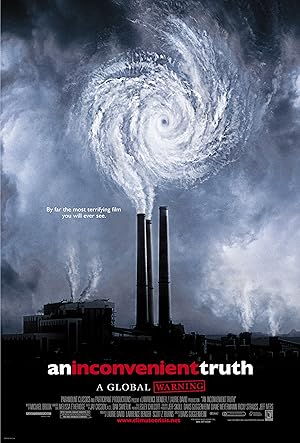
An Inconvenient Truth Page #9
Let me give you an example
of the wrong way to balance
the economy and the environment.
One part of this issue
involves automobiles.
Japan has mileage standards up here.
Europe plans to pass Japan.
Our allies in Australia and Canada
are leaving us behind.
Here is where we are.
Now there's a reason for it.
They say that we can't protect
the environment too much
without threatening the economy
and threatening the automakers.
Because automakers in China might
come in and just steal all our markets.
Well, here is where China's
auto mileage standards are now.
Way above ours.
We can't sell our cars in China today
because we don't meet
the Chinese environmental standards.
California has taken an initiative
to have higher-mileage cars
sold in California.
Now the auto companies
have sued California
to prevent this law from taking effect
because, as they point out,
this would mean that California
would have to have cars for sale
that are as efficient 11 years from now
as China's are today.
Clearly too onerous a provision
to comply with.
And is this helping
our companies succeed?
Well, actually, if you look at
who's doing well in the world,
it's the companies that are building
more-efficient cars.
And our companies are in deep trouble.
Final misconception.
If we accept that this problem is real,
maybe it's just too big
to do anything about.
And, you know, there are a lot of people
who go straight from denial
to despair
without pausing
on the intermediate step
of actually doing something
about the problem.
And that's what I'd like to finish with.
The fact that we already know
everything we need to know
to effectively address this problem.
We've got to do a lot of things,
not just one.
If we use more efficient
electricity appliances,
we can save this much off
of the global warming pollution
that would otherwise be
put into the atmosphere.
If we use other end-use efficiency,
this much.
If we have higher mileage cars,
this much.
And all these begin to add up.
Other transport efficiency,
renewable technology,
carbon capture and sequestration.
A big solution that you're gonna
be hearing a lot more about.
They all add up,
and pretty soon we are below
our 1970 emissions.
We have everything we need,
save perhaps political will.
But you know what? In America,
political will is a renewable resource.
We have the ability to do this.
Each one of us is
but each of us can make choices
to change that.
With the things we buy, the electricity
we use, the cars we drive,
we can make choices to bring
our individual carbon emissions to zero.
The solutions are in our hands.
We just have to have the determination
to make them happen.
Are we gonna be left behind
as the rest of the world moves forward?
All of these nations have ratified Kyoto.
There are only two advanced nations
in the world that have not ratified Kyoto,
and we are one of them.
The other is Australia.
Luckily, several states
are taking the initiative.
The nine northeastern states
have banded together
on reducing CO2.
California and Oregon are taking
the initiative.
Pennsylvania's exercising leadership
on solar power and wind power.
stepping up to the plate.
One after the other, we have seen
all of these cities pledge
to take on global warming.
So what about the rest of us?
Ultimately this question
comes down to this.
Are we, as Americans,
even though they are difficult?
Are we capable
and above history?
Well, the record indicates
that we do have that capacity.
We formed a nation,
we fought a revolution
and brought something new
to this Earth,
a free nation guaranteeing
individual liberty.
America made a moral decision.
Its slavery was wrong,
and that we could not be half free
and half slave.
We, as Americans, decided
that of course
women should have the right to vote.
We defeated totalitarianism
and won a war
in the Pacific and the Atlantic
simultaneously.
We desegregated our schools.
And we cured fearsome diseases
like polio.
We landed on the moon.
The very example of what's possible
when we are at our best.
We worked together
in a completely bipartisan way
to bring down communism.
We have even solved
a global environmental crisis before,
the hole in the stratospheric
ozone layer.
This was said to be
an impossible problem to solve
because it's
a global environmental challenge
requiring cooperation
from every nation in the world.
But we took it on.
And the United States took the lead
in phasing out the chemicals
that caused that problem.
So now we have to use our political
processes in our democracy,
and then decide to act together
to solve those problems.
But we have to have
a different perspective on this one.
It's different from any problem
we have ever faced before.
You remember that home movie
of the Earth spinning in space?
One of those spacecraft continuing
on out into the universe,
when it got four billion miles
out in space,
Carl Sagan said,
"Let's take another picture of the Earth."
You see that pale blue dot?
That's us.
Everything that has ever happened
in all of human history
has happened on that pixel.
All the triumphs and all the tragedies.
All the wars, all the famines.
All the major advances.
It's our only home.
And that is what is at stake.
Our ability to live
on planet Earth,
to have a future as a civilization.
I believe this is a moral issue.
It is your time to seize this issue.
It is our time to rise again,
to secure our future.
There's nothing that unusual
about what I'm doing with this.
What is unusual is that
I had the privilege to be shown it
as a young man.
Ladies and gentlemen, Mr. Al Gore.
It's almost as if a window was opened
through which
the future was very clearly visible.
"See that?" he said, "See that?
"That's the future in which you are
going to live your life."
Future generations
may well have occasion
to ask themselves,
"What were our parents thinking?
"Why didn't they wake up
when they had a chance?"
We have to hear that question
from them, now.
Translation
Translate and read this script in other languages:
Select another language:
- - Select -
- 简体中文 (Chinese - Simplified)
- 繁體中文 (Chinese - Traditional)
- Español (Spanish)
- Esperanto (Esperanto)
- 日本語 (Japanese)
- Português (Portuguese)
- Deutsch (German)
- العربية (Arabic)
- Français (French)
- Русский (Russian)
- ಕನ್ನಡ (Kannada)
- 한국어 (Korean)
- עברית (Hebrew)
- Gaeilge (Irish)
- Українська (Ukrainian)
- اردو (Urdu)
- Magyar (Hungarian)
- मानक हिन्दी (Hindi)
- Indonesia (Indonesian)
- Italiano (Italian)
- தமிழ் (Tamil)
- Türkçe (Turkish)
- తెలుగు (Telugu)
- ภาษาไทย (Thai)
- Tiếng Việt (Vietnamese)
- Čeština (Czech)
- Polski (Polish)
- Bahasa Indonesia (Indonesian)
- Românește (Romanian)
- Nederlands (Dutch)
- Ελληνικά (Greek)
- Latinum (Latin)
- Svenska (Swedish)
- Dansk (Danish)
- Suomi (Finnish)
- فارسی (Persian)
- ייִדיש (Yiddish)
- հայերեն (Armenian)
- Norsk (Norwegian)
- English (English)
Citation
Use the citation below to add this screenplay to your bibliography:
Style:MLAChicagoAPA
"An Inconvenient Truth" Scripts.com. STANDS4 LLC, 2025. Web. 23 Feb. 2025. <https://www.scripts.com/script/an_inconvenient_truth_2787>.







Discuss this script with the community:
Report Comment
We're doing our best to make sure our content is useful, accurate and safe.
If by any chance you spot an inappropriate comment while navigating through our website please use this form to let us know, and we'll take care of it shortly.
Attachment
You need to be logged in to favorite.
Log In